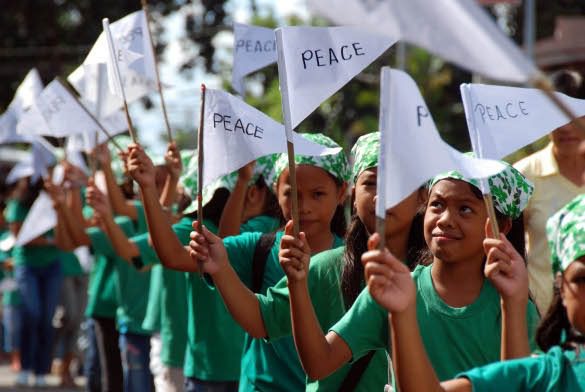Global Issues
The Achievements Of Peace Is The Lost Of War

Ten years ago, the world underwent what at that time and afterwards has been seen as ‘paradigm change’: the Cold War and with it the bipolar system with the US and the Soviet Union as leaders of the respective alliance systems came abruptly to an end and gave way to a new global situation in which only the United States survived as a world power. The end of the political and military confrontation between the so called ‘superpowers’ removed instantly the threat of nuclear annihilation and freed all of mankind of a major physical and psychic menace. General relief after decades of paralyzing fear under the grave risk of the balance of terror took hold and encouraged peoples all over this world and especially students of peace and conflict to renew their hopes for a more peaceful future. Not only did the President of the United States speak of a new world order, but many other voices were heard praising this revolution of 1989 and envisioning a more harmonious and stable global community. The newly found unanimity among most polities and their governments about the principles of interstate relations and the deepened commitment to justice, cooperation and security as the lasting foundation of the emerging universal community included, in particular, a joint decision to reactivate and strengthen the international organizations at the global as well as regional levels to respond to the likely challenges of global governance and to approach in a multilateral mode also important new issues of security and peace in the various regions of the world.
Everybody is fully aware of the quick and sobering realization within less than a year that the golden age of peace and unity had not yet arrived and that the collapse of the rigid bipolar system was followed by numerous bitter conflicts especially in the former Communist empire and in various former satellite states leading to extreme violence, fragmentation and dismemberment. The removal of the Cold War regimen liberated all of Eastern Europe and eased the bondage of smaller and weaker dependent States for which adhesion to one or the other superpower was not a matter of free choice, but of bitter necessity. The principal effect of the 1989 revolution was the welcome opportunity for local leaders in government or insurgents to seek their own solution(s) to their long-standing disputes and rivalries.
These tectonic movements in the global system dampened any premature enthusiasm about the new world order and became even more harmful as a result of the unexpected blatant aggression by Iraq against neighboring Kuwait in summer 1990. Suddenly the joy of peace and harmony turned into dismay and anger about the breach of the global order and the unmistakable warning by the sole world Power that the annexation of Kuwait would not stand and be reversed, if necessary, by force. While the global campaign against the Iraqi aggression illustrated the thrust and strength of the world community in unity, it also offered a first intimation that the seemingly solid front of the world’s leading Powers and intergovernmental organizations might fracture as a result of the unwelcome dominance of the United States in the various organs of global and regional governance. Thus, the inspiration and early optimism in regard of world peace especially dear to the peace research community and to the peace movement dimmed quickly to be replaced by a new skepticism and a restoration of traditional research and advocacy agendas.
The following essay is an endeavor to review and assess the published writings of bona fide ‘peace researchers’ and academic cohorts sharing their viewpoint and dealing with the same kind of relevant issues. More specifically, its purpose is to distill what one might call findings and substantive contributions by students of peace and conflict in the post-Cold War era to the understanding of the evolving global system and to the promotion of the lofty aim of world peace.
The scholarly community and the general public are fully aware of the undeniable fact that despite all the rhetoric voiced by leaders of government and despite the universal longing for a world in safety and at peace, the next century will not magically bring us Kant’s ‘eternal peace’, not even what Kenneth Boulding labelled ‘stable peace’ (Kenneth Boulding, 1989; also 1978) nor ‘positive peace’, i.e. peace with justice. At best, the ‘peace workers’ (Galtung, 1996a, 1996b) will patiently pursue their goals either in research and education or in campaigns and field work of the peace movements seeking to approximate, incrementally, step by step, and with occasional reversals, the final destination of a global peace order.
Despite the daunting acknowledgment that world peace is still a distant hope or possibly even an illusion, the broad survey over the intellectual production of the last ten years provides a useful picture of the pragmatism and empiricism as well as idealism with which students of peace and conflict have examined a wide variety of issues in order to obtain a deeper understanding of the causes of violence and the opportunities for peace. While the focus is placed on peace research qua research, a principal practice-relevant topic has been selected for the review of concrete findings. This main issue area is the cluster of recent theoretical, conceptual and empirical work dealing with conflict resolution or, put differently, with the search for methods and techniques to resolve conflicts in a nonviolent or violence-free manner. Although various other topics of the unbounded overflowing agenda of contemporary peace and conflict research deserve closer inspection, the decision to restrict this paper to this one issue area reflects my belief that the study of conflict resolution constitutes a central part of the research agenda and output of peace scholars and exemplifies what peace research is all about. Other topics and questions in the field of contemporary peace research are the subject of a larger study currently pursued by this author.


















